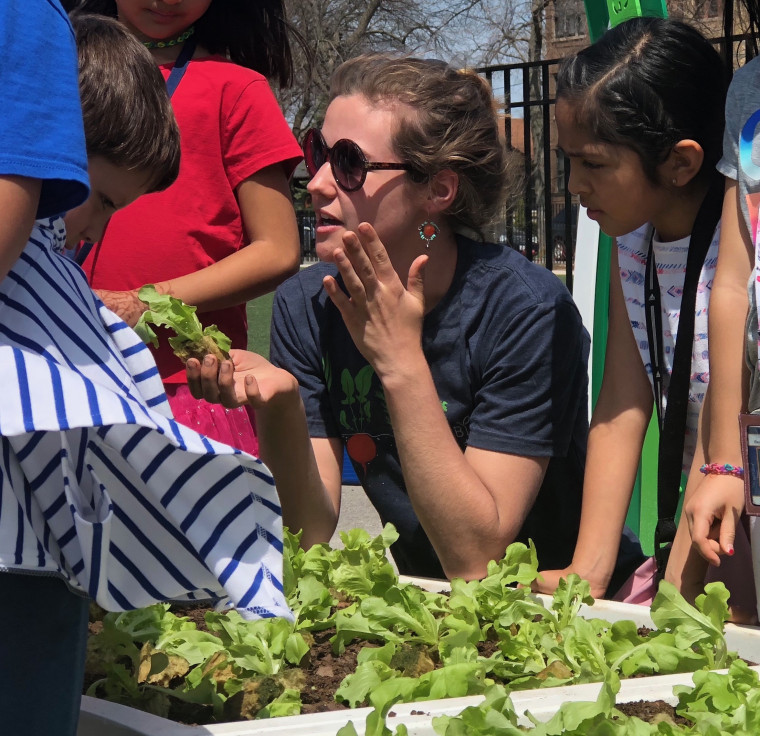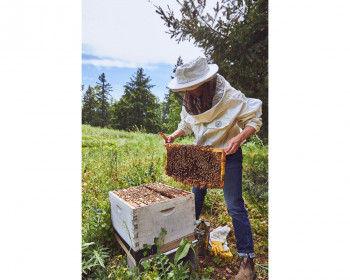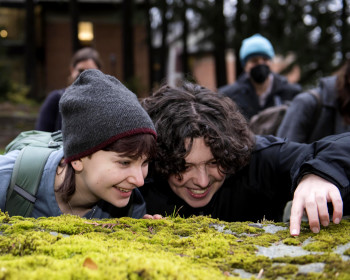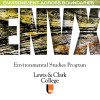Finding Meaning and Motivation through School Gardens
Open gallery

“I hope you grow big and strong,” the second grade student beside me whispers to the radish seed clasped tightly in her hand before tucking the seed into the soil gently. It’s a typical Tuesday morning for me as I help the teachers and students on Chicago’s South Side plant their fall garden. It’s a revolutionary act to grow your own food, especially in the city. As students crowd around the garden beds, observing dill that’s gone to seed, catching grasshoppers, and plucking kale to take home with them, the space exudes excitement and positivity.
I work as a Garden Educator for Big Green, a nonprofit organization that has built gardens just like this one at 200 schools in Chicago. To those who think that gardens have a limited impact, consider that during WWII, Victory Gardens provided almost half of the fruits and vegetables consumed in the U.S. These school gardens provide more than just healthy produce for the school community, they are the setting for using experiential education to teach everything from the implications of regenerative agriculture to the role fruits and vegetables play in developing brains. We engage a “train the teacher” model to build capacity for garden management in the school community and instruct educators on teaching food literacy. Food literacy is the knowledge of where food comes from and its impacts on the environment and community.
Like many students at Lewis & Clark, I came to college with a love of the outdoors. This, combined with a love of cooking, led me to one intersection of food and the environment: agriculture. During my time at LC, I used an academic lens to study the complex web of food, culture, and natural environment that shapes how we grow and consume food in the United States. One thing I loved about Environmental Studies was the flexibility to create my own area of focus within the major. I was able to craft a course of study to fit my interest in sustainable agriculture. The Environmental Studies program also gave me the opportunity to complete a grant funded research project the summer before my senior year through a Mellon Grant. After studying abroad in Australia, I extended my time there, conducting qualitative interviews of farmers and participant observation of sheep farms in Australia. This research was the basis for my senior thesis project and ignited my desire to travel and learn more about agricultural systems globally.
After graduation, I spent 5 months traveling in India before settling into a job as an Urban Farm Educator at Zenger Farm in Portland. Under the mentorship of some incredible leaders there, I cut my teeth as a food educator and health advocate. I learned how pertinent food literacy is in terms of combating preventable diet-related illness and supporting responsible agricultural methods. Although I was very happy in that job, I was eager to move away from Portland and use my skills in a more urban area, which is what eventually led me to Chicago.
Looking back on my career path since graduating, it almost appears as if I followed a track that I laid out for myself early on, yet I can assure you that is not the case. My life during and after college has been a series of unfoldings and explorations, of saying “yes!” to opportunities as they arise, and of not losing hope when things don’t go as planned. I think it’s good to have an idea of what you’d like to accomplish with your studies and career, but try not to hold a limited view of how that might pan out.
The interdisciplinary approach of ENVS provides the flexibility to explore a myriad of academic topics. The courses and the amazing professors at LC will push you to be rigorous and intentional in your study, and that’s a wonderful thing! If you’re like me and want to do things like live in the Australian outback or backpack in the Himalayas, do it! But find ways to advocate for the benefits and outcomes of these experiences to a professor or an employer or grant-funder or graduate school. Explore opportunities that are available to you through coursework or grants and use those to shape your narrative. In regards to your interests, ask yourself: why is the work worth doing? Follow the trail of classes, jobs, and experiences that are meaningful to you, yet remain open minded and flexible to opportunities as they arise. I think if you really focus on what you feel is meaningful and impactful, that will encourage you to work hard and invest in your work. And, of course, engage with the amazing community of professors and alumni that ENVS provides!
More Environmental Studies Stories
Environmental Studies is located in room 343A of John R. Howard Hall on the Undergraduate Campus.
MSC: 62
email envs@lclark.edu
voice 503-768-7790
fax 503-768-7620
Symposium Advisor Jessica Kleiss
Environmental Studies
Lewis & Clark
615 S. Palatine Hill Road MSC 62
Portland OR 97219


